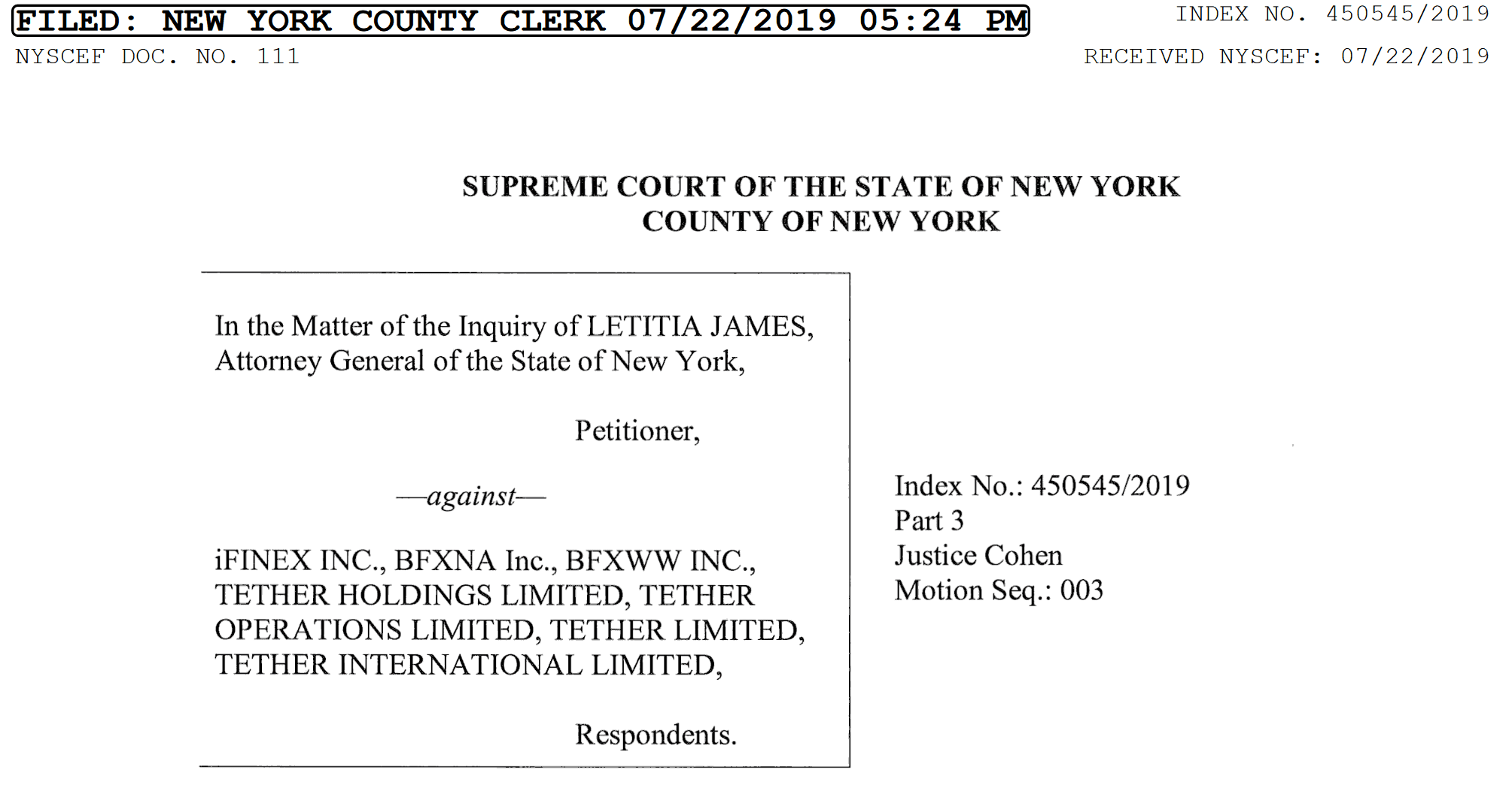In a
According to a legal probe filed

The stable token
Tether has more than $2.8 billion in circulating volume, making it a top 10 cryptocurrency, and has become a key tool for cryptocurrency trading and speculation. Since at least 2017, critics have questioned Tether’s claims that Tether tokens are fully backed by U.S. dollars held by banks. In March, Tether changed its terms of service to read that Tethers are backed by a mix of currency and “other assets.” Prior to late March 2019 Tether represented that every outstanding tether was “backed” by.andt hus should be valued at one U.S.dollar.Tether represented to investors that “Every tether is always backed 1-to-1 by traditional currency held in our reserves. So 1 USDT is always equivalent to 1 USD.
$850 million seized or lost
Later in 2018, Bitfinex and Tether executives discovered that Crypto Capital had stolen, lost or seized $850 million. James alleges that the shortfall was covered by at least $700 million meant to back Tether. This $700 million were part of a credit line extended to Bitfinex from Tether of up to $900 million. Bitfinex used $700 million of Tether reserves to hide the Bitfinex loss from investors. James claims Bitfinex and Tether have defrauded New York investors.
Our investigation has determined that the operators of the ‘Bitfinex’ trading platform, who also control the ‘tether’ virtual currency, have engaged in a cover-up to hide the apparent loss of $850 million of
Letitia James, New York Attorney General’s Officecommingled client and corporate funds.New York state has led the way in requiring virtual currency businesses to operate according to the law. And we will continue to stand up for investors and seek justice on their behalf when misled or cheated by any of these companies.
The Bitfinex and Tether response
In their response Tether claimed that the New York Attorney General’s filings were “written in bad faith and are riddled with false assertions.” Furthermore, it purports that $850 million of funds once held by payment processor Crypto Capital are not “lost,” but “have been, in fact, seized and safeguarded.” Crypto Capital claimed to Bitfinex that as much as $851 million had been seized by government authorities in Portugal, Poland, and the United States. The filing states, however, that Bitfinex believes that Crypto Capital’s principals may be engaged in fraud.
They said the case, purportedly filed to “protect New York investors,” fails on a jurisdictional level because their companies “have nothing to do with New York investors — the businesses do not allow New Yorkers on their platforms and do not advertise or otherwise do business here.“
In a reply submitted to the New York Supreme Court, iFinex General Counsel Stuart Hoegner argued that the clients cited by the filing as New York-based investors are all “Eligible Contract Participants (ECP),” entities that are permitted by regulation to trade on unregistered foreign exchanges. Traders who then bought tethers using these ECPs as an intermediary, he wrote, qualify as customers of the ECPs, not Tether and Bitfinex themselves.
Tether is not a security
The respondents further challenged James’ office’s Martin Act claims given Tether‘s cryptocurrency has not been deemed a security or commodity under the act. The Martin Act is a New York State law providing the attorney general with wide powers to combat securities fraud.
Liquidity issues fixed?
According to an iFinex filing dated July 23, 2019, the matter against Bitfinex and Tether must be dismissed over lack of jurisdiction, the companies reiterated in the last round of filings before a state court judge rules on stay proceedings after a hearing next Monday. The cryptocurrency sister companies describe the allegations as “inaccurate” and “misleading,” while insisting that Bitfinex is well on the way to fulfilling its obligations to creditors affected by the seizure of hundreds of millions of dollars of commingled corporate and customer funds in 2018.
